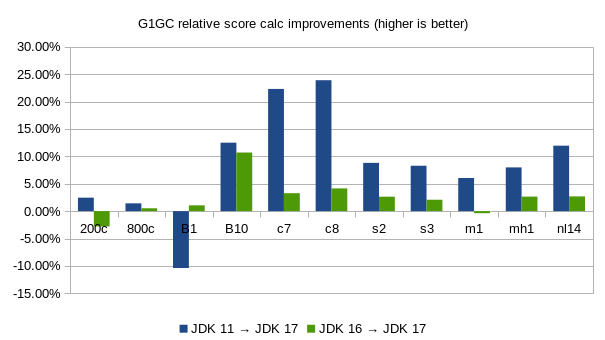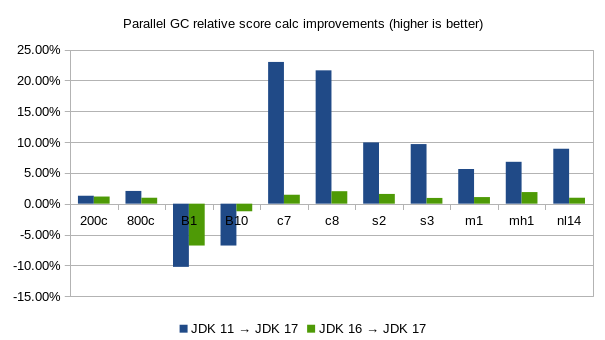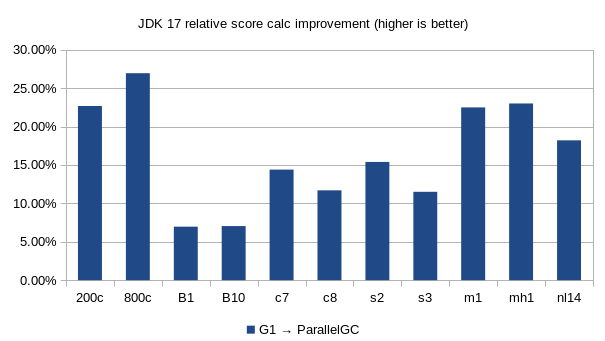How much faster is Java 17?
Java 17 (released yesterday) comes with many new features and enhancements. However, most of those require code changes to benefit from. Except for performance. Simply switch your JDK installation and you get a free performance boost. But how much? Is it worth it? Let’s find out by comparing the benchmarks of JDK 17, JDK 16 and JDK 11.
Benchmark methodology
- Hardware: A stable machine without any other computational demanding processes running and with
Intel® Xeon® Silver 4116 @ 2.1 GHz (12 cores total / 24 threads)and128 GiBRAM memory, runningRHEL 8 x86_64. - JDKs (used to both compile and run):
- JDK 11
openjdk 11.0.12 2021-07-20 OpenJDK Runtime Environment Temurin-11.0.12+7 (build 11.0.12+7) OpenJDK 64-Bit Server VM Temurin-11.0.12+7 (build 11.0.12+7, mixed mode)
- JDK 16
openjdk 16.0.2 2021-07-20 OpenJDK Runtime Environment (build 16.0.2+7-67) OpenJDK 64-Bit Server VM (build 16.0.2+7-67, mixed mode, sharing)
- JDK 17 (downloaded 2021-09-06)
openjdk 17 2021-09-14 OpenJDK Runtime Environment (build 17+35-2724) OpenJDK 64-Bit Server VM (build 17+35-2724, mixed mode, sharing)
- JDK 11
- JVM options:
-Xmx3840Mand explicitly specify a garbage collector:-XX:+UseG1GCfor G1GC, the low latency garbage collector (the default in all three JDKs).-XX:+UseParallelGCfor ParallelGC, the high throughput garbage collector.
- Main class:
org.optaplanner.examples.app.GeneralOptaPlannerBenchmarkAppfrom the moduleoptaplanner-examplesin OptaPlanner8.10.0.Final.- Each run solves 11 planning problems with OptaPlanner, such as employee rostering, school timetabling and cloud optimization. Each planning problem runs for 5 minutes. Logging is set to
INFO. The benchmark starts with a 30 second JVM warm up which is discarded. - Solving a planning problem involves no IO (except a few milliseconds during startup to load the input). A single CPU is completely saturated. It constantly creates many short-lived objects, and the GC collects them afterwards.
- The benchmarks measure the number of scores calculated per second. Higher is better. Calculating a score for a proposed planning solution is non-trivial: it involves many calculations, including checking for conflicts between every entity and every other entity.
- Each run solves 11 planning problems with OptaPlanner, such as employee rostering, school timetabling and cloud optimization. Each planning problem runs for 5 minutes. Logging is set to
- Runs: Each JDK and each garbage collector combination is run 3 times sequentially. The results below is the average of those 3 runs.
Results
Java 11 (LTS) and Java 16 versus Java 17 (LTS)
| Average | Cloud balancing | Machine reassignment | Course scheduling | Exam scheduling | Nurse rostering | Traveling Tournament | ||||||
| Dataset | 200c | 800c | B1 | B10 | c7 | c8 | s2 | s3 | m1 | mh1 | nl14 | |
| JDK 11 | 103,606 | 96,700 | 274,103 | 37,421 | 11,779 | 13,660 | 14,354 | 8,982 | 3,585 | 3,335 | 5,019 | |
| JDK 16 | 109,203 | 97,567 | 243,096 | 38,031 | 13,950 | 16,251 | 15,218 | 9,528 | 3,817 | 3,508 | 5,472 | |
| JDK 17 | 106,147 | 98,069 | 245,645 | 42,096 | 14,406 | 16,924 | 15,619 | 9,726 | 3,802 | 3,601 | 5,618 | |
| 11 → 17 | 8.66% | 2.45% | 1.42% | -10.38% | 12.49% | 22.30% | 23.90% | 8.81% | 8.28% | 6.05% | 7.98% | 11.95% |
| 16 → 17 | 2.41% | -2.80% | 0.51% | 1.05% | 10.69% | 3.27% | 4.14% | 2.63% | 2.08% | -0.39% | 2.65% | 2.67% |
| Average | Cloud balancing | Machine reassignment | Course scheduling | Exam scheduling | Nurse rostering | Traveling Tournament | ||||||
| Dataset | 200c | 800c | B1 | B10 | c7 | c8 | s2 | s3 | m1 | mh1 | nl14 | |
| JDK 11 | 128,553 | 121,974 | 292,761 | 48,339 | 13,397 | 15,540 | 16,392 | 9,887 | 4,409 | 4,148 | 6,097 | |
| JDK 16 | 128,723 | 123,314 | 281,882 | 45,622 | 16,243 | 18,528 | 17,742 | 10,744 | 4,608 | 4,348 | 6,578 | |
| JDK 17 | 130,215 | 124,498 | 262,753 | 45,058 | 16,479 | 18,904 | 18,023 | 10,845 | 4,658 | 4,430 | 6,641 | |
| 11 → 17 | 6.54% | 1.29% | 2.07% | -10.25% | -6.79% | 23.00% | 21.64% | 9.95% | 9.68% | 5.63% | 6.80% | 8.92% |
| 16 → 17 | 0.37% | 1.16% | 0.96% | -6.79% | -1.24% | 1.45% | 2.03% | 1.59% | 0.94% | 1.08% | 1.89% | 0.96% |
Note | Looking at the raw data of the 3 individual runs (not shown here), the Machine Reassignment numbers (B1 and B10) fluctuate a lot between runs on the same JDK and GC. Often by more than 10%. The other numbers don’t suffer from this unreliability. It’s arguably better to ignore the Machine Reassignment numbers. But to avoid cherry-picking data concerns, these results and averages do include them. |
G1GC versus ParallelGC on Java 17
| Average | Cloud balancing | Machine reassignment | Course scheduling | Exam scheduling | Nurse rostering. | Traveling Tournament | ||||||
| Dataset | 200c | 800c | B1 | B10 | c7 | c8 | s2 | s3 | m1 | mh1 | nl14 | |
| G1GC | 106,147 | 98,069 | 245,645 | 42,096 | 14,406 | 16,924 | 15,619 | 9,726 | 3,802 | 3,601 | 5,618 | |
| ParallelGC | 130,215 | 124,498 | 262,753 | 45,058 | 16,479 | 18,904 | 18,023 | 10,845 | 4,658 | 4,430 | 6,641 | |
| G1 → ParallelGC | 16.39% | 22.67% | 26.95% | 6.96% | 7.04% | 14.39% | 11.69% | 15.39% | 11.50% | 22.50% | 23.01% | 18.20% |
Executive summary
On average, for OptaPlanner use cases, these benchmarks indicate that:
- Java 17 is 8.66% faster than Java 11 and 2.41% faster than Java 16 for G1GC (default).
- Java 17 is 6.54% faster than Java 11 and 0.37% faster than Java 16 for ParallelGC.
- The Parallel Garbage Collector is 16.39% faster than the G1 Garbage Collector.
No big surprises here: the latest JDK is faster and the high throughput garbage collector is faster than the low latency garbage collector.
Wait a minute here…
When we benchmarked JDK 15, we saw that Java 15 was 11.24% faster than Java 11. Now, the gain of Java 17 over Java 11 is less. Does that mean that Java 17 is slower than Java 15?
Well, no. Java 17 is faster than Java 15 too. Those previous benchmarks were run on a different codebase (OptaPlanner 7.44 instead of 8.10). Don’t compare apples and oranges.
Conclusion
In conclusion, the performance gained in the JDK17 version is well worth the upgrade – at least for OptaPlanner use cases.
In addition, the fastest garbage collector for these use cases is still ParallelGC, instead of G1GC (the default).
Published on Java Code Geeks with permission by Geoffrey De Smet, partner at our JCG program. See the original article here: How much faster is Java 17? Opinions expressed by Java Code Geeks contributors are their own. |





